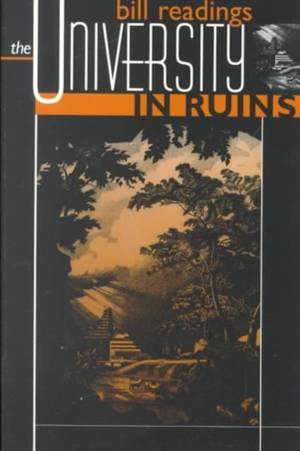
- Retrait gratuit dans votre magasin Club
- 7.000.000 titres dans notre catalogue
- Payer en toute sécurité
- Toujours un magasin près de chez vous
- Retrait gratuit dans votre magasin Club
- 7.000.0000 titres dans notre catalogue
- Payer en toute sécurité
- Toujours un magasin près de chez vous
Description
It is no longer clear what role the University plays in society. The structure of the contemporary University is changing rapidly, and we have yet to understand what precisely these changes will mean. Is a new age dawning for the University, the renaissance of higher education under way? Or is the University in the twilight of its social function, the demise of higher education fast approaching?We can answer such questions only if we look carefully at the different roles the University has played historically and then imagine how it might be possible to live, and to think, amid the ruins of the University. Tracing the roots of the modern American University in German philosophy and in the work of British thinkers such as Newman and Arnold, Bill Readings argues that historically the integrity of the modern University has been linked to the nation-state, which it has served by promoting and protecting the idea of a national culture. But now the nation-state is in decline, and national culture no longer needs to be either promoted or protected. Increasingly, universities are turning into transnational corporations, and the idea of culture is being replaced by the discourse of "excellence." On the surface, this does not seem particularly pernicious.
The author cautions, however, that we should not embrace this techno-bureaucratic appeal too quickly. The new University of Excellence is a corporation driven by market forces, and, as such, is more interested in profit margins than in thought. Readings urges us to imagine how to think, without concession to corporate excellence or recourse to romantic nostalgia within an institution in ruins. The result is a passionate appeal for a new community of thinkers.Spécifications
Parties prenantes
- Auteur(s) :
- Editeur:
Contenu
- Nombre de pages :
- 256
- Langue:
- Anglais
Caractéristiques
- EAN:
- 9780674929531
- Date de parution :
- 30-10-97
- Format:
- Livre broché
- Format numérique:
- Trade paperback (VS)
- Dimensions :
- 159 mm x 232 mm
- Poids :
- 290 g

Les avis
Nous publions uniquement les avis qui respectent les conditions requises. Consultez nos conditions pour les avis.






